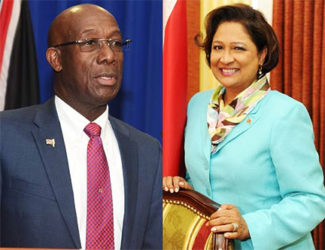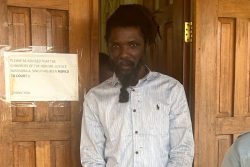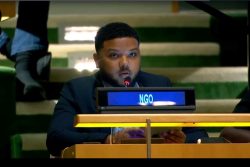(Trinidad Express) Criminals are getting the better of all of us in this country, says Prime Minister Dr Keith Rowley, and yesterday’s crime meeting between Government and Opposition will only bear fruit, if the police earn the people’s trust and the politicians work in the Parliament and enact effective crime-fighting laws.
Among the ideas proposed were the abolishing of preliminary enquiries and trial by jury in some cases, since part of the problem to be solved is criminals targeting not only their victims but witnesses to the crimes.
Both sides also agreed that the death sentence should remain the law of the land.
Speaking at a press conference in Port of Spain following the meeting, Rowley said there was agreement that there needed to be effective cooperation between Government and Opposition, since without the right legislation, the police “will continue to be largely ineffective”.
There have been at least 311 homicides this year so far, with the police solving less than 10 per cent of the crimes.
Joint Select Committee

He said it was agreed that a Joint Select Committee be set up, represented by both sides and chaired by an Independent Senator, to ensure that the political acrimony that may exist between sides does not affect the work.
Rowley said mutual respect was necessary between the Government and Opposition.
“We are hoping that the relationship between Parliamentarians can be improved dramatically (with) mutual respect and responsibility so that we can discharge our duties to the electorate, people we represent, more effectively. There is agreement that we need to improve in that area. And all of this might only talk.
The visit today might only be a sham. It is only when we get to the Parliament and we effect the turning of the page as mentioned in the meeting today that we will know if today has really borne any fruit”, said Rowley.
Rowley said that it was agreed that the police ability to gather information was “an area of absolute effectiveness that has to be there, otherwise it will continue to be largely ineffective”.
However, he said he was optimistic.
Second look at Section 34
Also raised at the meeting was the infamous Section 34 law, which was proclaimed on August 31, 2012, also had allowed individuals who were charged with particular offences to have the cases dismissed if the trial did not start after ten years after the charges were laid.
The Section required the accused to apply to the High Court to have the matters dismissed, and more than 40 applicants petitioned the Court. However, before the applications were considered by the High Court, Parliament repealed the section of law on September 12, 2012.
Rowley said it was acknowledged at the meeting that Section 34 would have prevented some of the issues plaguing the judicial system and “the Opposition indicated a willingness for us to start over and get down what that bill had intended to do which is to help us accelerate cases through the court system”.
Death by Hanging
Rowley said that the Government and the Opposition are of the view that capital punishment should remain as law as an effective response to particular crimes committed. He said that the Privy Council affirmed that capital punishment can be carried out in Trinidad and Tobago lawfully and under certain conditions outlined. Rowley said: “The bottom line is the Privy Council has affirmed that, that law is lawful and capital punishment can be carried out in Trinidad and Tobago.
Secondly, the Privy Council has outlined the conditions under which it can be done and that is that all the proceedings must be concluded and upon conviction that capital punishment is carried out within a five year period”. He said that interference with the law and the creation of new conditions would allow the Privy Council the opportunity to permanently change the role of capital punishment and even abolish it.
“If we interfere with that law and create new conditions to the law we open the door for the privy council to permanently effectively abolish capital punishment in Trinidad and Tobago…The reason why they have not abolished it is because of the old law which is beyond the reach of the Privy Council”, said Rowley. Rowley said the issue will warrant further discussions with the Opposition.
16 crime fighting laws identified
Sixteen pieces of legislation were identified for debate and passage by Attorney General Faris al Rawi. He said Government will be focusing on taking the profit out of crime.
Al-Rawi said: “We were able to provide the Opposition with a list of 16 items, those 16 items were just a snippet of some of the matters which we have as very urgent priority matters .
They can be separated out into improvements to the criminal justice system and very importantly, taking the profit out of crime. We are convinced that many of the laws stand on the books, Trinidad and Tobago and don’t have the kind of impact into crime and we feel that it is very critical for us as a country to go behind the money because it is money which floats crime.”
At the meeting the Government was represented by Prime Minister Dr Keith Rowley, Marlene McDonald, Attorney General Faris al Rawi, Stuart Young, and Edmund Dillon.
The Opposition was represented by Kamla Persad-Bissessar, Roodal Moonilal, Gerald Hadeed, Ramona Ramdial, and Wade Mark.








